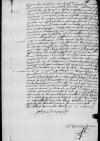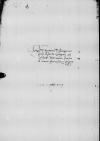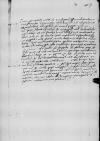Letter #1836
Ioannes DANTISCUS to Tiedemann GIESEHeilsberg (Lidzbark), 1538-03-01
English register:
Dantiscus expresses disapproval of the doings of Heinrich [Snellenberg]. He considers them to be unworthy trade and hopes Heinrich will hold off on the “transaction” (auctio) until meeting and speaking with Dantiscus in person in Frauenburg (Frombork) (apud ecclesiam). He is also concerned about what Giese told him recently in Heilsberg, when Dantiscus was giving instructions to Achatius Trenck regarding the vestment (vestis tabinea), namely that someone had promised Heinrich that Dantiscus would assume responsibility for all the promises of the previous Bishop [Mauritius Ferber]. Dantiscus’ anticipated meeting with Achatius Trenck in Dietrichswalde (Gietrzwałd) did not take place.
Dantiscus requests more details regarding Braunsberg’s (Braniewo’s) excise evasion.
Like Giese, Dantiscus is awaiting [package] from Rome.
Dantiscus has already demanded several times that the Gdańsk (Danzig) Town Council stop collecting the duties they imposed on beer traders. Despite this, they ask that the duties be maintained until the Diet [of Royal Prussia] in May. Dantiscus considers the fee to be inadmissible in dioceses [Ermland (Warmia) and Kulm (Chełmno)]. He fears that agreeing could lead to further duties being imposed in the future, and therefore encourages Giese to write to the Gdańsk Town Council as well, demanding that they stop collecting duties and return what they have already collected.
Dantiscus asks for information about the date when the addressee received three thousand marks from the Gdańsk Town Council.
| received 1538-03-02 Manuscript sources:
Prints:
| ||||||
Text & apparatus & commentary Plain text Text & commentary Text & apparatus Excerpts concerning Dantiscus' travels
Reverendissimo Domino
Reverendissime Domine, frater et amice carissime et honoran(de) or honoran(dissime)⌈honoran(de)honoran(de) or honoran(dissime)⌉.
Salutem et amoris mei commendationem plurimam.
Oblitus sum superiori die de eo Dominationi Vestrae Reverendissimae cf.
Quantum autem nos eiusmodi dedecent paper damaged⌈[t]t paper damaged⌉ pacta, ne assis quidem plerique aestimant. Si animus
Remordet me et hoc, quod novissime hic mihi Dominatio Vestra Reverendissima dixit, nescio quem meo nomine
cf.
Alia in praesenti non restant, quam quod perinde atque Dominatio Vestra Reverendissima pendeo in exspectatione ex
Ex
Reverendissimae Dominationis Vestrae integerrimus frater
Postscript:
 BCz, 245, p. [1] missed in numbering after p. 8
BCz, 245, p. [1] missed in numbering after p. 8
Cum gentilibus nostris[6] de vectigali, quod[7] venditoribus et emptoribus cervisiae constituerunt, iam aliquoties cf.
De censu trium millium marcarum, quas Dominatio Vestra Reverendissima percepit, significarunt mihi, quod mox post integrum elapsum annum iuxta litteras meas eam pecuniam Dominationi Vestrae Reverendissimae numeraverint, medium vero gross(um) ratione auri hornen(sis)[8] solverunt.[9] Ut me ideo de tempore perceptionis Dominatio Vestra Reverendissima edoceat, oro plurimum etc.[10]


